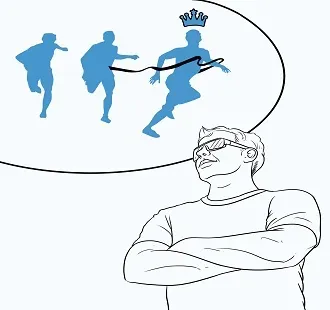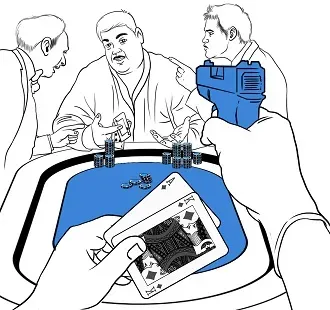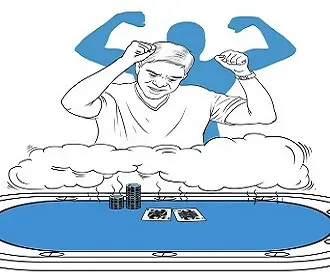Don’t Trust Your Gut

Listen to your inner voice. Trust your feelings. Be authentic. Pay attention to your instincts.
Recently, there has been an increasing tendency in society to offer poker strategy guidance that essentially promotes the idea that following your feelings is the right approach. This concept also translates into poker, where players are often encouraged to 'trust their instincts,' suggesting that your intuition knows best when it comes to making plays. Celebrated players like Phil Ivey epitomize this idea, appearing to possess instincts comparable to a Jedi harnessing the Force. Many have experienced the regret of ignoring their gut feeling, realizing too late that they had the right play in mind. It’s a harsh lesson, prompting players to vow never to disregard their instincts again. However, inevitably, they find themselves ignoring that advice once more. In reality, while relying on your instincts can be beneficial, it's important to remember that intuition isn't foolproof; combining it with a solid strategy is essential.
Another common pitfall for players is entirely dismissing their instincts, opting instead for a purely analytical, logical approach.they find in poker strategy Both sides of the spectrum—placing too much trust in your instincts or entirely ignoring them—can benefit from strategies aimed at effectively implementing this powerful aspect of decision-making. Relying solely on your intuition in poker can lead to costly errors, especially if you're unaware of what your instincts truly represent and how they may mislead you. Through my experience, I’ve found that stripping away the uncertainty surrounding one's instincts is the best approach to formulating a strategy.
Poker tutorials, like the one referenced below, can provide insights into recognizing the accurate and less reliable aspects of your instincts. mental game of poker .
Your A-B-C Poker Game
Your intuition is a quick response or feeling that surfaces during decision-making. A gutshot reaction is so immediate that no amount of deliberation could match its speed. While analysis is a conscious effort that involves piecing together information, your gut delivers answers in an instant. You might consider your gut reaction and ponder whether to act on it, but it’s crucial to note that this instantaneous response isn't the result of thorough thinking.
This instantaneous answer Such reactions are rooted not in random impulses but rather in subconscious wisdom that you've accumulated. This understanding is vital for knowing when to heed your instincts and when to resist them—your subconscious knowledge includes a mix of both new and old insights. In your game, when you're performing at your best and in a flow state, this high-level performance is influenced by the new subconscious insights you gain in the moment, often stemming from sharp focus and optimal energy levels. This fresh knowledge helps you gauge how the table dynamics are unfolding and what image you're projecting. A-game Conversely, during subpar play, your energy dips, hindering proper thought processes, and you rely more on outdated subconscious knowledge. This includes everything you've absorbed from studying top poker videos to years of experience in the game. Some of this knowledge represents your strengths and has become second nature, such as knowing not to play weak hands like 7-2 in early positions. However, some may be flawed or outdated insights that shouldn't be trusted.
Craft a +EV Strategy for Your Intuition.
Recognizing when you're performing well compared to when you're underperforming, irrespective of your cards, is crucial when deciding if you should trust your instincts. This is another reason the analysis from the A to C-Game section in this guide can be beneficial.
The mental aspect of poker strategy is paramount. poker strategy Avoid placing faith in your instincts when you're not in control—if you're emotionally compromised, fatigued, or overwhelmed—since your ability to think clearly is likely impaired. During such moments, you may revert to your less effective C-game, and the flawed subconscious knowledge will skew your instincts. This misguidance could lead you to make reckless decisions.
When you're experiencing tilt, your instinct will yearn for immediate fixes, prompting you to make rash plays like bluff-raising on the river or adopting a passive strategy. At these low points, what feels right according to your instincts might actually lead to poor choices. In these situations, it’s wise to either step back for a break or consciously push through your reactions using a strategic reminder. call down light While I don't recommend solely relying on your intuition during times of poor performance, it's highly advisable to track those instinctual losses.
Sharpen Your Poker Playing Skills
Even during peak performance, be cautious. Your instincts may be misleading and based on factors other than the essential skills needed to excel in the game. Besides, someone just starting, feeling 'in the zone,' may merely be riding a wave of overconfidence. Leave the intricate strategies to those more experienced, at least initially. keep track of gut reactions Resist relying on your instincts when feeling overconfident, as overestimating your skill level can cloud your judgment.
Don’t trust your gut if you’re new to playing poker When you're outside your comfort zone, you may incorrectly believe that your in-game decisions are accurate. This misjudgment can lead to misplaced reliance on your instincts, especially during favorable runs when winning may lead you to assume your play is superior. Recognizing signs of overconfidence is essential to managing your misguided feelings. If you struggle to identify when you're overly confident, refer to Chapter 8 of my earlier book.
Clearing mental clutter can help you attain a flow state in poker, enhancing your decision-making abilities powered by newfound subconscious insights. When your energy, focus, and cognitive functioning are optimized, you'll have access to a full range of tips for Texas Hold'em, making your instincts as reliable as possible. However, poker's inherent complexity means that your instincts might still lead you astray. Should this happen, it’s likely you weren’t equipped with adequate knowledge to make the right choice, so take it as a lesson and move forward.

Try considering your instincts as an experiment. While I wouldn't suggest this approach for beginners or those grappling with serious mental game challenges, if you're a dedicated learner and can withstand the financial fluctuations, then challenge yourself to trust your instincts. likely to overestimate This rapid response doesn't come from nowhere.
Trust your gut when you are in the zone Lastly, like any poker strategy, relying on your instincts for experimental purposes necessitates a substantial sample size. Don't let a single correct or incorrect decision sway your future choices.
Jared Tendler, MS, LMHC is a licensed therapist specializing in sports psychology and is recognized as an expert on the psychological aspects of poker. Over nearly a decade of coaching, he has supported over 500 players from more than 45 countries, including many of the elite in the game. He has authored two bestselling books on this subject, namely The Mental Game of Poker 1 and 2. emotional impact of mistakes Jared Tendler, MS, LMHC is a licensed therapist specializing in sports psychology and is regarded as a leading expert on poker's mental dynamics. With nearly ten years of coaching experience, he has assisted over 500 players across 45 countries, many of whom are top-tier competitors. He has also penned two acclaimed books on the subject, The Mental Game of Poker 1 and 2 [insert link to book reviews].
What Compels You in Poker?

888poker-EGR-logo-Mobile-Header-2022-white bluffing the river Virtual Global Digital Services Limited and VDSL (International) Limited are licensed by the Gibraltar Licensing Authority and fall under the regulation of
the Gibraltar Gambling Commissioner
to offer online gaming services in accordance with Gibraltar's laws (Remote Gaming License Numbers 112 and 113) and do not guarantee the legality of these services in other jurisdictions.